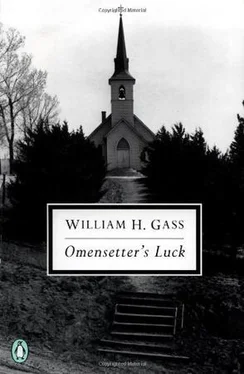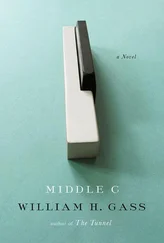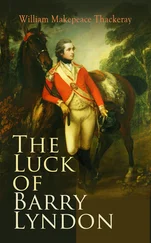William Gass - Omensetter’s Luck
Здесь есть возможность читать онлайн «William Gass - Omensetter’s Luck» весь текст электронной книги совершенно бесплатно (целиком полную версию без сокращений). В некоторых случаях можно слушать аудио, скачать через торрент в формате fb2 и присутствует краткое содержание. Год выпуска: 1997, Издательство: Penguin Classics, Жанр: Современная проза, на китайском языке. Описание произведения, (предисловие) а так же отзывы посетителей доступны на портале библиотеки ЛибКат.
- Название:Omensetter’s Luck
- Автор:
- Издательство:Penguin Classics
- Жанр:
- Год:1997
- ISBN:нет данных
- Рейтинг книги:3 / 5. Голосов: 1
-
Избранное:Добавить в избранное
- Отзывы:
-
Ваша оценка:
- 60
- 1
- 2
- 3
- 4
- 5
Omensetter’s Luck: краткое содержание, описание и аннотация
Предлагаем к чтению аннотацию, описание, краткое содержание или предисловие (зависит от того, что написал сам автор книги «Omensetter’s Luck»). Если вы не нашли необходимую информацию о книге — напишите в комментариях, мы постараемся отыскать её.
is the quirky, impressionistic, and breathtakingly original story of an ordinary community galvanized by the presence of an extraordinary man. Set in a small Ohio town in the 1890s, it chronicles — through the voices of various participants and observers — the confrontation between Brackett Omensetter, a man of preternatural goodness, and the Reverend Jethro Furber, a preacher crazed with a propensity for violent thoughts.
meticulously brings to life a specific time and place as it illuminates timeless questions about life, love, good, and evil.
Omensetter’s Luck — читать онлайн бесплатно полную книгу (весь текст) целиком
Ниже представлен текст книги, разбитый по страницам. Система сохранения места последней прочитанной страницы, позволяет с удобством читать онлайн бесплатно книгу «Omensetter’s Luck», без необходимости каждый раз заново искать на чём Вы остановились. Поставьте закладку, и сможете в любой момент перейти на страницу, на которой закончили чтение.
Интервал:
Закладка:
Ding dong bell,
Pimber's down our well.
Didn't I wait until a wind could blow away my lie?
Who never did him any harm,
But wound his soul through a sleeve
of arm.
Just the same I thought the way you walked through town, Henry was whispering just barely aloud, carrying your back as easy and as careless as you would a towel, newly come from swimming always, barely dry you always seemed, you were a sign. Remember that first evening when you came? You were a stranger, bare to heaven really, and your soul dwelled in your tongue when you spoke to me, as if I were a friend and not a stranger, as if I were an ear of your own. You had mud beneath your arms, mud sliding down the sides of your boots, thick stormy hair, dirty nails, a button missing. The clouds were glowing, a rich warm rose, and I watched them sail till dark when I came home. It seemed to me that you were like those clouds, as natural and beautiful. You knew the secret — how to be.
Henry cleared his throat. And had he simply been mistaken? Or had Omensetter been persuaded of his luck so thoroughly that now he guarded it like gold, and feared being thieved? Henry wrapped his arms like a kerchief round his head. Omensetter had been robbed already. Everybody but the preacher stole from him. Furber merely hated. But what I took was hope — a dream — fool's gold — quarrel — toothsome hen, Henry said. How weary he was, and sorry… sorry for everything. He was sorry about the rent, about the house, the damp, the open well, the river. He was sorry for Omensetter, sorry for Lucy, sorry for the children, sorry for Lucy again. He was sorry for himself. Tears pooled in his eyes.
Just the same, Henry said, I thought you measured us by your inhuman measure like the trees, and we were busy ants in hills or well-hived bees whose love was to pursue the queen and bring on death. When you put my hands in bandages and beets I thought I understood. There was no shade between us ever but the shade I'd drawn. You were the same to human or inhuman eye.
Henry slid from the log and hushed his whispering. He pushed at low shrubs until he couldn't see the sycamores. It was thick in this part of the woods. He parted the branches with his arms. Brackett Omensetter before he left had hid behind his face and made his back a wall. The man had been a miracle. He had, Henry spoke out angrily. A miracle. Not to be believed. And now he took defense against the world like everybody else. No miracle, a man, with a man's mask and a man's wall. Henry chuckled, unfastening the belt of his coat. He tugged at it. It would be strong. His pooled tears ran. If Brackett Omensetter had ever had the secret of how to live, he hadn't known it. Now the difference was-he knew. Everyone at last had managed to tell him, and now like everybody else he was wondering what it was. Like everybody else. Henry wiped his eyes. Don't look for Henry here, my dear, he's gone. He's full of foolishness, and off to kill a fox. But I'll not die as low as he did, for I could ornament a tree like the leaves of a maple. No. It should be tall. A white oak maybe, with its wide lobes. There was beauty in the pun: leave-taking. Though it wouldn't be an easy climb for a man who'd been so sick so recently. Still the sun would reach him early there and stay the day, the win blow pleasantly. It ought to seem like leaping to the sea. He went by cherry and by black gum trees calling their names aloud. He was the Adam who remembered them. Tears nevertheless began again. How sorry for it all he felt. How sorry for Omensetter. How sorry for Henry.
The Reverend,Jethro
Furber's Change of Heart
1
Rough dogs, barking, splashed into the river chasing sticks. Coats and ties had been hung in the trees and men were hurling stones at soda bottles or skimming pieces of slate and loudly counting the skips. He picked out squealing children and the laughter of the women. If there hadn't been a wall he would have seen them scuffling on the edge of the water. The land fell and the trees parted so that seated where he was the Ohio might have made his eyes blink, but the wall was eight feet high and wound in its vines like a bottle of claret. The bench was damp and cold, shadowed all morning by the elms, and he slid his Bible under him. It was a poor garden, given over to ground ivy and plants that preferred deep shade, for the sun reached it only at the top of the day when it found an opening between the crowns of the trees and the head and body of the church. Absently, he felt the pores of the cement. The shadows of the elm leaves passed gently over the vines and grasses. In winter one could see quite easily through the gate at the end of the garden to the river lying placidly in its ice — leaden, grave, immortal. He had never learned when the key had been lost but the lock was rusted now and the double gates were bound. By spring, when the ivy leafed and thickly curtained the pickets, his blindfold was complete. Nevertheless he could see the sand rising in little puffs and the brilliant water striking the shore. It wasn't true, but Jethro Furber felt he had spent his life here. Certainly he had brought to the garden the little order it had, laying the walk with his own hands and clearing the graves of weeds and creepers, carefully scrubbing the markers. The rough cold bench was as familiar to him as his skin, and the garden, with its secret design and its holy significance, was like himself. He smiled as he considered it (he had considered often), for the body of any symbol was absurd, as ridiculous as Christ's body was, so lank and ribby. And those crudely fashioned timbers thrust clumsily in the earth were foolish. The crucifixion was so far from love. How far was he from what he meant?… pale, pinch-faced little man in Negro-colored clothing, the nail-eyed reverend, Jethro Furber, fourth in this church and a liar; how far was he from the conscience of his people? That Scanlon girl was turning around, blooming her pink skirt, and The Noisy One was calling to his dog. He saw the hair of The Noisy One tossing like a girl's; his stones were shattering the water. Furber had told them what was due the Sabbath; he had thrown his voice on its knees before them shamefully; he had warned and threatened; he had rounded his words with brass and blown through them strongly like a choir of trumpets. But what use was it to preach? Futile. Futile. He could not face them down again. That, too, was futile. In three corners of the garden there were graves, crookedly laid, where the no longer living persons of his predecessors had been put away, and there was still an empty corner left for him to lie futile and forgotten in. All was proper and correct. Even the clichés of the preacher were correct: the no longer listening ears, the no longer swelling lungs, the no longer laughing teeth or dancing hair, the no longer bitterly envenomed prick. He struck his thigh, half rose, then settled slowly back again. Omensetter's stones dipped and flew and lit like gulls upon the water. Furber rubbed his teeth together so they squeaked, then shivered at the sound. Soon the sun will reach the bench, he thought, and the leaves will whiten. He would wait where he was. He would have to. Certainly he would not go out again.
He had his rehearsals here. Slowly, his head bowed, the Bible held firmly against his chest, he would circle the garden. His eyes would sweep over the ground near his feet, over the bruised leaves and bared roots, the grass stubble and the mud that oozed between stones. Lilies of the valley grew thickly near the wall where trails of crumbled mortar, smears of river damp and moss, were visible under the vines. Violets, chickweed and the buckhorn plantain flourished. There was privet still alive from a feeble attempt before his time to divide the garden with hedges, and a rose which the wind burned to the ground every winter sprawled over a rotting willow stump, its canes nearly leafless from disease, struggling to bloom. Chafers would feed upon the buds, yet he would stay his hand, verifying, once again, the destructive course of nature. Orange yellow when it flowered, it was a climber, and he thought he recognized its fragrance. A neighbor of his mother grew it, or she had… like a dream of gold along her fence— Rève d'or … and golden honeysuckle up the trellis of her porch, with strident morning glories too and clematis as purple as the robe of a king; and there were pearl-white lily trumpets, forsythia and lilacs like so many fountains, four o'clocks and bleeding heart, begonias spilling out of baskets swung from chains, straw flowers, daisies, pink hydrangeas that she sometimes fertilized with nails to make them blue, weedy magenta phlox and columbine, verbena, floppy red petunias, bachelor buttons, zinnias, round transparent pennyroyal to dry and press between the psalms, rose geraniums in pots along the rails, gentians, pinks, sweet peas, nasturtiums of the clearest orange… he peered at all this thick sweet beauty through the pickets, frightened somewhat, for they kept a dog, and at the rough sweet lawn, so cool and moist, the walk around it edged with snowy ageratum and violet alyssum, pansies pink as lips, stonecrop squeezing between the bricks, while in the beds behind them there were sky-blue asters on hooping stems, pale and methodical, as perfect as if they had been grown by spiders; and hidden by high grass and goldenrod and stock he would watch the woman, Mrs. Kermit Hazen — Maisie was it? did she live beyond her operation? Fidel was the dog — stretching her garish yellow print across her rump and show the roll of her stockings when she bent to cut the stems and pile the flowers in her dusty apron. Tears would form in his eyes, running the figures of the flowers and the woman together, and he would press the fence slats cruelly into his cheeks. She'd have planted marigolds nearby and through the fence he would reach one, uprooting it roughly and rubbing his face with its pungent leaves before he went into the house and gave his cheek to his aunt to kiss so she would sneeze.
Читать дальшеИнтервал:
Закладка:
Похожие книги на «Omensetter’s Luck»
Представляем Вашему вниманию похожие книги на «Omensetter’s Luck» списком для выбора. Мы отобрали схожую по названию и смыслу литературу в надежде предоставить читателям больше вариантов отыскать новые, интересные, ещё непрочитанные произведения.
Обсуждение, отзывы о книге «Omensetter’s Luck» и просто собственные мнения читателей. Оставьте ваши комментарии, напишите, что Вы думаете о произведении, его смысле или главных героях. Укажите что конкретно понравилось, а что нет, и почему Вы так считаете.












![William Frith - John Leech, His Life and Work, Vol. 2 [of 2]](/books/748201/william-frith-john-leech-his-life-and-work-vol-thumb.webp)